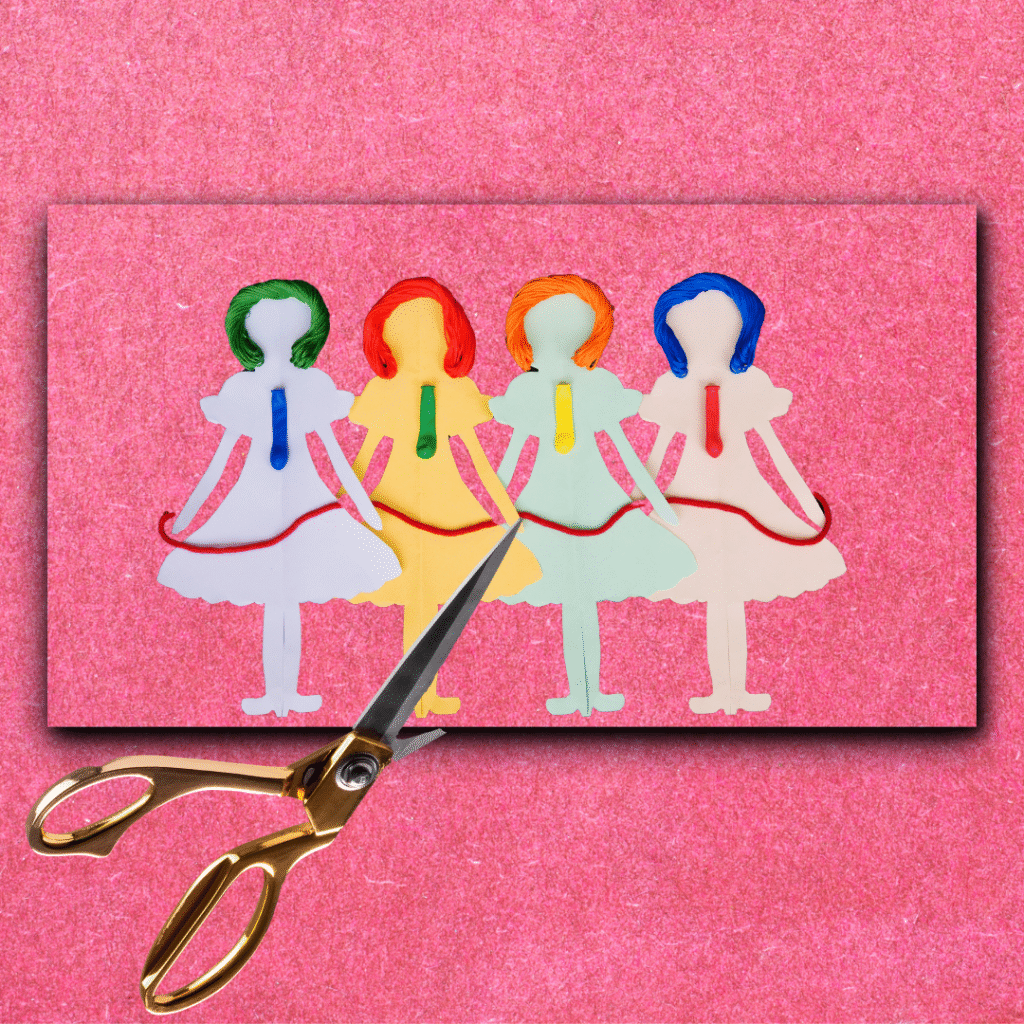Before trying to “fix” a friendship, we need to understand the dynamic that sustains it. Constant comparison—about body, partner, work—can sneak into even years-long bonds, and it does so with such subtlety that it’s hard to name. In this installment, we explore covert competition: what causes it, how it manifests, and what questions can help us restore (or refocus) the relationship.
Therefore, identifying what kind of dynamics govern our friendships is important. We cannot transform what we don’t recognize, and among the forces that most shape bonds between women, this silent rivalry stands out, flourishing under the guise of a joke, “for your own good” advice, or judgmental silence.
The social root of rivalry
Every stage of a woman’s life is accompanied by a set of expectations we rarely choose. Teenagers are expected to be innocent and have a “good reputation”; young adults, a stable partner and motherhood; mature women, family self-sacrifice and eternally youthful appearance. Adding the modern mandate to shine professionally creates an impossible equation: multiple medals to win… with the feeling that there are few to share. This perception of scarcity is fertile ground for competition.
Ursula Pfeiffer, co-founder of Yuriyana Club, points out that the problem is not in wanting to improve, but in measuring one’s self-worth solely by contrast: “When another’s achievement is interpreted as one’s own defeat, friendship becomes an unbalanced scale that never rests.” The challenge is to abandon this unjust scale and regain a broader perspective, where one’s success adds to everyone’s.
How competition sneaks into everyday conversations
Female rivalry doesn’t usually present itself with obvious blows; it prefers the subtlety of ambiguous gestures:
- A “it looks good on you, you can’t tell you gained weight” pronounced with a smile.
- The lack of a message when you announce good news, followed by immediate presence when you share a setback.
- Offers of help that implicitly suggest you would never achieve it without that support.
These are micro-aggressions that, in isolation, seem harmless. Together, they erode trust and sow doubts about the authenticity of the bond.
Seven dimensions to X-ray friendship
Evaluating a relationship requires more than intuition. To avoid hasty judgments—or ignoring clear signals—Ursula proposes seven areas for review. Answer them sincerely and also examine your own role: competition is a dance for two.
1. Emotional state
Do you leave inspired or exhausted after each encounter? Recurring lightness indicates a healthy flow; constant draining suggests an imbalance to correct.
2. Support or minimization of achievements
Celebrating with genuine joy is different from congratulating with a “but”: “Congratulations on the promotion! Though anyone could get that position…” Observe whether another’s merit is honored without diminishing its shine.
3. Boundaries and respect
Saying “no” should feel safe. If you fear emotional retaliation—guilt, hurtful jokes, calculated distance—it’s time to reinforce boundaries.
4. Reciprocity
Care is not measured in exact accounts, but in a mutual sense of support. Ask yourself: does the scale oscillate or remain fixed on your side?
5. Authenticity in communication
Can you discuss sensitive topics without sarcasm or humiliation? Long-lasting friendships go through disagreements; the key is to discuss with respect, not avoid.
6. Personal enrichment
A nurturing friend boosts your goals, even if they differ from hers. If every aspiration of your own receives mockery or apocalyptic warnings, it’s worth rethinking the bond.
7. Respected values
Plurality enriches; contempt for another’s choice does not. Review whether ideological or lifestyle differences are approached with curiosity or judgment.
Turning comparison into a driver for progress
Envy does not disappear by decree. It transforms when we use it as a compass:
- Name the emotion. Admitting “I feel envy” disarms shame and opens space for curiosity.
- Analyze the hidden message. What part of another’s achievement resonates with a postponed desire of your own?
- Translate discomfort into a plan. Design a realistic step to get closer to that longing.
- Congratulate specifically. Recognizing another’s merit in detail reinforces complicity and reduces rivalry.
When comparison becomes inspiration, both grow instead of competing.
Strategies for repairing or letting go
If the review reveals red flags, the first step is dialogue. Choose a quiet moment, describe facts (not judgments), and ask for concrete changes: “When you comment on my appearance in front of the group, I feel exposed; I need you to keep that matter for a private chat.” Listen to her perspective: perhaps she acts without awareness. If there is receptivity, agree on new rules and evaluate progress.
But not all friendships want—or can—transform. If your interlocutor mocks, downplays, or repeats the pattern, consider protective distance: reduce encounters, share fewer personal topics, or, in extreme cases, close the cycle. Prioritizing your emotional health is not betrayal; it is self-care.
Intrinsic gratitude versus comparative gratitude
Practicing gratitude without comparison strengthens self-esteem and weakens the need for external validation. Dedicate a few minutes a day to record three valuable experiences that do not depend on what others do: a quiet coffee, a walk in the sun, an inspiring page of reading. The more you fine-tune your internal recognition, the less room there will be for rivalry.
Next steps in this series
This reflection is the first of four installments dedicated to female friendship. In the following articles, we will address:
- Frenemies: signs to detect the drama addict and the positive narcissist.
- Difficult conversations: tools to resolve conflicts and rebuild trust when it’s worthwhile.
- Support circles: creating female networks where collaboration definitively replaces comparison.
Meanwhile, apply the seven dimensions as a practical exercise. Keep a notebook, record feelings after each encounter, and decide what conversations you need to open.
To delve deeper into the ideas of this episode, watch the full session on our YouTube channel:
Becoming aware of covert competition is not about blaming, but about clearing the path for freer and more nurturing friendships. After all, growing together is more powerful than competing in silence.


